Evan Roskos's Blog, page 7
February 22, 2013
Whitman: A million suns left (11 days to DR. BIRD)
More wisdom from Whitman, this time from the 1892 version of "Song of Myself" section 2:
"Have you reckon'd a thousand acres much? have you reckon'd the earth much?
Have you practis'd so long to learn to read?
Have you felt so proud to get at the meaning of poems?
Stop this day and night with me and you shall possess the origin of all poems,
You shall possess the good of the earth and sun, (there are a million suns left,)
You shall no longer take things at second or third hand, nor look through the eyes of the dead, nor feed on the spectres in books,
You shall not look through my eyes either, nor take things from me,
You shall listen to all sides and filter them from your self." [1892]
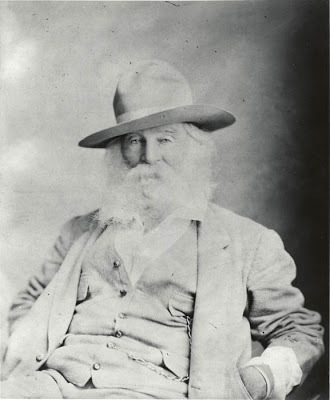 "You shall not look through my eyes either, nor take things from me"
"You shall not look through my eyes either, nor take things from me"
"Have you reckon'd a thousand acres much? have you reckon'd the earth much?
Have you practis'd so long to learn to read?
Have you felt so proud to get at the meaning of poems?
Stop this day and night with me and you shall possess the origin of all poems,
You shall possess the good of the earth and sun, (there are a million suns left,)
You shall no longer take things at second or third hand, nor look through the eyes of the dead, nor feed on the spectres in books,
You shall not look through my eyes either, nor take things from me,
You shall listen to all sides and filter them from your self." [1892]
 "You shall not look through my eyes either, nor take things from me"
"You shall not look through my eyes either, nor take things from me"
Published on February 22, 2013 07:00
February 21, 2013
Whitman: Commonest (12 days to DR. BIRD)
What is commonest, cheapest, nearest, easiest, is Me,
Me going in for my chances, spending for vast returns,
Adorning myself to bestow myself on the first that will take me,
Not asking the sky to come down to my good will,
Scattering it freely forever.
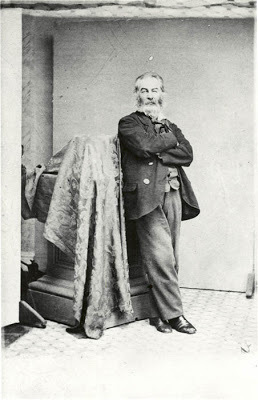 "Adorning myself to bestow myself"
"Adorning myself to bestow myself"
Me going in for my chances, spending for vast returns,
Adorning myself to bestow myself on the first that will take me,
Not asking the sky to come down to my good will,
Scattering it freely forever.
 "Adorning myself to bestow myself"
"Adorning myself to bestow myself"
Published on February 21, 2013 07:00
Commonest (Countdown to DR. BIRD)
"What is commonest, cheapest, nearest, easiest, is Me,
Me going in for my chances, spending for vast returns,
Adorning myself to bestow myself on the first that will take me,
Not asking the sky to come down to my good will,
Scattering it freely forever."
 "Adorning myself to bestow myself"
"Adorning myself to bestow myself"
Me going in for my chances, spending for vast returns,
Adorning myself to bestow myself on the first that will take me,
Not asking the sky to come down to my good will,
Scattering it freely forever."
 "Adorning myself to bestow myself"
"Adorning myself to bestow myself"
Published on February 21, 2013 07:00
February 20, 2013
Whitman: Vivas! (13 to DR. BIRD'S ADVICE FOR SAD POETS
Our countdown continues today with a passage from "Song of Myself" section 18:
"With music strong I come, with my cornets and my drums,
I play not marches for accepted victors only, I play marches for conquer'd and slain persons.
Have you heard that it was good to gain the day?
I also say it is good to fall, battles are lost in the same spirit in which they are won.
I beat and pound for the dead,
I blow through my embouchures my loudest and gayest for them.
Vivas to those who have fail'd!
And to those whose war-vessels sank in the sea!
And to those themselves who sank in the sea!
And to all generals that lost engagements, and all overcome heroes!
And the numberless unknown heroes equal to the greatest heroes known!" [1892]
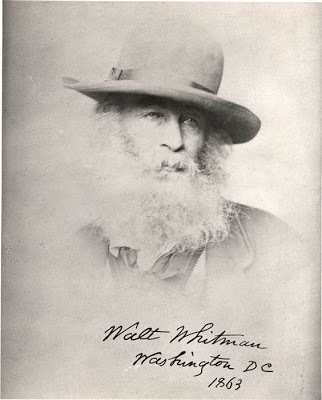 Vivas!
Vivas!
"With music strong I come, with my cornets and my drums,
I play not marches for accepted victors only, I play marches for conquer'd and slain persons.
Have you heard that it was good to gain the day?
I also say it is good to fall, battles are lost in the same spirit in which they are won.
I beat and pound for the dead,
I blow through my embouchures my loudest and gayest for them.
Vivas to those who have fail'd!
And to those whose war-vessels sank in the sea!
And to those themselves who sank in the sea!
And to all generals that lost engagements, and all overcome heroes!
And the numberless unknown heroes equal to the greatest heroes known!" [1892]
 Vivas!
Vivas!
Published on February 20, 2013 07:00
Vivas! (Countdown to DR. BIRD'S ADVICE FOR SAD POETS
Our countdown continues today with a passage from "Song of Myself" section 18:
"With music strong I come, with my cornets and my drums,
I play not marches for accepted victors only, I play marches for conquer'd and slain persons.
Have you heard that it was good to gain the day?
I also say it is good to fall, battles are lost in the same spirit in which they are won.
I beat and pound for the dead,
I blow through my embouchures my loudest and gayest for them.
Vivas to those who have fail'd!
And to those whose war-vessels sank in the sea!
And to those themselves who sank in the sea!
And to all generals that lost engagements, and all overcome heroes!
And the numberless unknown heroes equal to the greatest heroes known!" [1892]
 Vivas!
Vivas!
"With music strong I come, with my cornets and my drums,
I play not marches for accepted victors only, I play marches for conquer'd and slain persons.
Have you heard that it was good to gain the day?
I also say it is good to fall, battles are lost in the same spirit in which they are won.
I beat and pound for the dead,
I blow through my embouchures my loudest and gayest for them.
Vivas to those who have fail'd!
And to those whose war-vessels sank in the sea!
And to those themselves who sank in the sea!
And to all generals that lost engagements, and all overcome heroes!
And the numberless unknown heroes equal to the greatest heroes known!" [1892]
 Vivas!
Vivas!
Published on February 20, 2013 07:00
February 19, 2013
Whitman: 14 days to Dr. Bird's Advice for Sad Poets
With fourteen days remaining until the release of
Dr. Bird's Advice for Sad Poets
, I give you a Walt Whitman gem from the "Preface to Leaves of Grass (1855)":
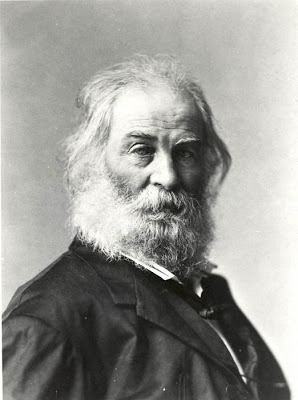 "Men and women perceive the beauty enough, probably as well as [the Poet]...."
"Men and women perceive the beauty enough, probably as well as [the Poet]...."
Love the earth and sun and the animals, despise riches, give alms to every one that asks, stand up for the stupid and crazy, devote your income and labor to others, hate tyrants, argue not concerning God, have patience and indulgence toward the people, take off your hat to nothing known or unknown or to any man or number of men, go freely with powerful uneducated persons and with the young and with the mothers of families, read these leaves in the open air every season of every year of your life, re-examine all you have been told at school or church or in any book, dismiss whatever insults your own soul, and your very flesh shall be a great poem and have the richest fluency not only in its words but in the silent lines of its lips and face and between the lashes of your eyes and in every motion and joint of your body……..
 "Men and women perceive the beauty enough, probably as well as [the Poet]...."
"Men and women perceive the beauty enough, probably as well as [the Poet]...."
Published on February 19, 2013 11:18
On Whitman: Countdown
With fourteen days remaining until the release of
Dr. Bird's Advice for Sad Poets
, I give you a Walt Whitman gem from the "Preface to Leaves of Grass (1855)":
 "Men and women perceive the beauty enough, probably as well as [the Poet]...."
"Men and women perceive the beauty enough, probably as well as [the Poet]...."
Love the earth and sun and the animals, despise riches, give alms to every one that asks, stand up for the stupid and crazy, devote your income and labor to others, hate tyrants, argue not concerning God, have patience and indulgence toward the people, take off your hat to nothing known or unknown or to any man or number of men, go freely with powerful uneducated persons and with the young and with the mothers of families, read these leaves in the open air every season of every year of your life, re-examine all you have been told at school or church or in any book, dismiss whatever insults your own soul, and your very flesh shall be a great poem and have the richest fluency not only in its words but in the silent lines of its lips and face and between the lashes of your eyes and in every motion and joint of your body……..
 "Men and women perceive the beauty enough, probably as well as [the Poet]...."
"Men and women perceive the beauty enough, probably as well as [the Poet]...."
Published on February 19, 2013 11:18
February 8, 2013
On Alice in Chains
I've been listening to lots of Alice in Chains recently. One of my favorite bands from the 90s, their music had that nice blend of dirty guitar, dark lyrics, and amazing vocals that pleased this heavy metal and grunge music fan more than most bands. Jerry Cantrell, I should note, is a phenomenal songwriter and his backing vocals on much of AIC's work provides a texture that's unique, but also made the band's reunited effort, Black Gives Way to Blue, both a familiar and excellent album even if the original vocalist, Layne Staley, was nowhere to be found thanks to his drug overdose in 2002.
The Onion's non-satirical A/V Club has a great article about Layne Staley's life and death that I also came across recently. It's a fantastic and sad look at Staley's decline as well as a deep appreciation for Dirt, which is the band's masterpiece and a clear chronicle of the singer's struggle with (and sad unwillingness to overcome) heroin addiction. The album showcases a variety of attitudes about drug use, most of them more complex than simple regret or hope. Certainly titles like "Junkman," "Sickman," and "Hate to Feel" suggest Staley is already resigned to his fate as a user, likely an overdoser. Consider, also, the various lyrics:
"ah, what's the difference, i'll die / in this sick world of mine" -- Sickman
"Seem so sick to the hypocrite norm / Running their boring drills / But we are an elite race of our own/ The stoners, junkies and freaks" -- Junkman
"What in God's name have you done? / Stick your arm for some real fun!" -- Godsmack
Whether celebrating the status of the sick outsider, at least aware of his hypocrisies, or lamenting the pain he's causing himself, Staley's songs never find a true joy, only gritty rejection of what I'm sure were well-meaning pleas from his friends and family to get off of junk. ("Godsmack" itself seems to be a rejection of the Narcotics Anonymous or Alcoholics Anonymous method of placing faith in a higher power in an effort to find strength to kick the habit. "And God's name is smack for some" is Staley's gruff response. Later followed by the more solemn declaration "Down in a hole and I don't know if I can be saved" underscored by the foggy questions of the entire song "Would?" which links Staley to another drug overdose story from the Seattle scene, Andrew Wood (who's sad death resulted in the founding of Pearl Jam.)
So, I've got the Alice In Chains Unplugged album on this morning as I write and after "Heaven Beside You" Staley says, "I would have to say that this is the best show we've done in about 3 years." In the background, one of the other bandmembers responds with "Layne, this is the ONLY one we've done in three years."
Layne's response: "It's still the best." Laughs. They then play "Would?"
I didn't know it at the time because I was not a major concert-going teen, but Layne's drug problem had limited Alice in Chain's ability to play shows in the mid-90s. Their last major tour with Staley was 1993, when I was 15. I saw them at Lollapalooza that year and bought two Alice in Chain shirts. They played "Godsmack," my favorite song at the time because of the guitars and chorus.
MTV recorded the Unplugged show in April 1996. The band would perform only 4 more concerts together, with the last performance coming in July 1996.
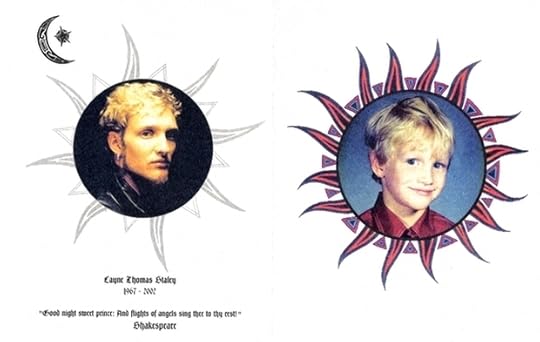 Handout from 2002 Memorial ServiceStaley was found dead in April of 2002; "the tip-off that something was amiss came not from concerned family members or friends but from Staley’s accountants, who noticed that he hadn’t spent any money in several days." This, from a 2003 SeattleWeekly article on heroin's resurgence in Seattle, says more than anything about what is lost:
Handout from 2002 Memorial ServiceStaley was found dead in April of 2002; "the tip-off that something was amiss came not from concerned family members or friends but from Staley’s accountants, who noticed that he hadn’t spent any money in several days." This, from a 2003 SeattleWeekly article on heroin's resurgence in Seattle, says more than anything about what is lost:
Donations to aid in addiction recovery services are best made locally to area communities where you can see the benefits; those in the Seattle, WA area can contribute directly to the Layne Staley Memorial Fund here.
The Onion's non-satirical A/V Club has a great article about Layne Staley's life and death that I also came across recently. It's a fantastic and sad look at Staley's decline as well as a deep appreciation for Dirt, which is the band's masterpiece and a clear chronicle of the singer's struggle with (and sad unwillingness to overcome) heroin addiction. The album showcases a variety of attitudes about drug use, most of them more complex than simple regret or hope. Certainly titles like "Junkman," "Sickman," and "Hate to Feel" suggest Staley is already resigned to his fate as a user, likely an overdoser. Consider, also, the various lyrics:
"ah, what's the difference, i'll die / in this sick world of mine" -- Sickman
"Seem so sick to the hypocrite norm / Running their boring drills / But we are an elite race of our own/ The stoners, junkies and freaks" -- Junkman
"What in God's name have you done? / Stick your arm for some real fun!" -- Godsmack
Whether celebrating the status of the sick outsider, at least aware of his hypocrisies, or lamenting the pain he's causing himself, Staley's songs never find a true joy, only gritty rejection of what I'm sure were well-meaning pleas from his friends and family to get off of junk. ("Godsmack" itself seems to be a rejection of the Narcotics Anonymous or Alcoholics Anonymous method of placing faith in a higher power in an effort to find strength to kick the habit. "And God's name is smack for some" is Staley's gruff response. Later followed by the more solemn declaration "Down in a hole and I don't know if I can be saved" underscored by the foggy questions of the entire song "Would?" which links Staley to another drug overdose story from the Seattle scene, Andrew Wood (who's sad death resulted in the founding of Pearl Jam.)
So, I've got the Alice In Chains Unplugged album on this morning as I write and after "Heaven Beside You" Staley says, "I would have to say that this is the best show we've done in about 3 years." In the background, one of the other bandmembers responds with "Layne, this is the ONLY one we've done in three years."
Layne's response: "It's still the best." Laughs. They then play "Would?"
I didn't know it at the time because I was not a major concert-going teen, but Layne's drug problem had limited Alice in Chain's ability to play shows in the mid-90s. Their last major tour with Staley was 1993, when I was 15. I saw them at Lollapalooza that year and bought two Alice in Chain shirts. They played "Godsmack," my favorite song at the time because of the guitars and chorus.
MTV recorded the Unplugged show in April 1996. The band would perform only 4 more concerts together, with the last performance coming in July 1996.
 Handout from 2002 Memorial ServiceStaley was found dead in April of 2002; "the tip-off that something was amiss came not from concerned family members or friends but from Staley’s accountants, who noticed that he hadn’t spent any money in several days." This, from a 2003 SeattleWeekly article on heroin's resurgence in Seattle, says more than anything about what is lost:
Handout from 2002 Memorial ServiceStaley was found dead in April of 2002; "the tip-off that something was amiss came not from concerned family members or friends but from Staley’s accountants, who noticed that he hadn’t spent any money in several days." This, from a 2003 SeattleWeekly article on heroin's resurgence in Seattle, says more than anything about what is lost:In addition to the singer's tracked-up and paraphernalia-littered bathroom and front room, detectives found a kitchen counter covered with more used needles, more narcotics pipes, and more spray-paint cans. Needles also were found beneath Staley when his 86-pound body was removed. He lived alone in the two-story, three-bedroom apartment (one bedroom contained toys and video games, another musical instruments; the master bedroom had a bed and TV). When police played back Staley's answering-machine tape, it was filled with two weeks' worth of calls asking where he was.
Donations to aid in addiction recovery services are best made locally to area communities where you can see the benefits; those in the Seattle, WA area can contribute directly to the Layne Staley Memorial Fund here.
Published on February 08, 2013 09:07
February 5, 2013
On Radiohead's Water Obsession
People who know me, know I'm a bit of a Radiohead fan. In fact, the top hits for a Google search of my name once were song lyric interpretations on Radiohead sites.
I'm not embarrassed, though I am glad newer things have taken the top spot.
 WATER! © Evan Roskos 2012
WATER! © Evan Roskos 2012
One of the great things about following Radiohead for so long is the magic of becoming familiar with lead singer Thom Yorke's various obsessions. My favorite is his constant anxiety about water, which now far surpasses his once famous obsession with car accidents.
Seriously, Yorke sees water hazards all over the place. If he's not asking us to "pull him out of the lake," he's going to "jump into river" or "jump off the end / into a clear lake" after he's "lost at sea" and "floats down the Liffey" or warns us that "The waters break, the waters run all over [him]", which isn't surprising since if he's not "in the deepest ocean / at the bottom of the sea" worried about a "house falling into the sea" or how "the sea would / electrocute us all" or especially about how "the rain drops" (even though he asked for it to "rain down on [him]"), then he's "standing on a beach with [his] guitar" "while the ocean blooms" wishing someone would "build an ark" because, aside from all menacing water, there's an "iceage coming."
Okay, that last one's a stretch, but you get the point.
[Songs quoted: Lucky, Pyramid Song, Codex, In Limbo, How to Disappear Completely, Vegetable, Weird Fishes/Arpeggi, Where I End and You Begin, Nice Dream, Sit Down. Stand Up., Paranoid Android, Anyone Can Play Guitar, Bloom, Sail to the Moon, Idioteque]
I'm not embarrassed, though I am glad newer things have taken the top spot.
 WATER! © Evan Roskos 2012
WATER! © Evan Roskos 2012One of the great things about following Radiohead for so long is the magic of becoming familiar with lead singer Thom Yorke's various obsessions. My favorite is his constant anxiety about water, which now far surpasses his once famous obsession with car accidents.
Seriously, Yorke sees water hazards all over the place. If he's not asking us to "pull him out of the lake," he's going to "jump into river" or "jump off the end / into a clear lake" after he's "lost at sea" and "floats down the Liffey" or warns us that "The waters break, the waters run all over [him]", which isn't surprising since if he's not "in the deepest ocean / at the bottom of the sea" worried about a "house falling into the sea" or how "the sea would / electrocute us all" or especially about how "the rain drops" (even though he asked for it to "rain down on [him]"), then he's "standing on a beach with [his] guitar" "while the ocean blooms" wishing someone would "build an ark" because, aside from all menacing water, there's an "iceage coming."
Okay, that last one's a stretch, but you get the point.
[Songs quoted: Lucky, Pyramid Song, Codex, In Limbo, How to Disappear Completely, Vegetable, Weird Fishes/Arpeggi, Where I End and You Begin, Nice Dream, Sit Down. Stand Up., Paranoid Android, Anyone Can Play Guitar, Bloom, Sail to the Moon, Idioteque]
Published on February 05, 2013 06:47
January 21, 2013
On Being 35
Don DeLillo published his first novel in 1971. He was 34. His publisher was Houghton Mifflin.
Today I'm 35. In 43 days, Dr. Bird's Advice for Sad Poets will be published by Houghton Mifflin.
Don DeLillo is my favorite author. I'm never good at explaining why without sounding pedantic and hyper. Maybe it's like people who love The Grateful Dead. Hard to explain because it's the concert experience as much as, or more than, the music. For me, DeLillo writes sentences that fit neatly into neat crevices of my brain.
I do not write like him, though I admire his scope, his sentences, his sensibility.
I think of him today to help remember that there is no need to obsess over the age at which I achieved success, but simply celebrate that I did achieve it. Writing is difficult. Getting published is too. Seeing a book enter the world deserves celebration. While I once thought I could publish a novel in college or in my twenties, I followed a different course of action.
I didn't know how to write a good novel back then anyway, though I could read and analyze great ones easily.
Here's hoping my career lasts as long as DeLillo's has and that I gather up a few superfans along the way.
 New covers for DeLillo's novels for Picador
New covers for DeLillo's novels for Picador
I'm never good at telling people which DeLillo novel to start with since White Noise is funnier than most of his other works and might set people up to expect the same style in everything else. Libra is brilliant but might bore people who don't like historically informed fiction where the ending (Lee Oswald kills JFK and then gets killed by Jack Ruby) is already known. Underworld is too long for first-timers. On the opposite side, Cosmopolis is somewhat slight though it's the one I'm more likely to suggest for people who tried White Noise and didn't get it. Mao II is great for PhD aspirants and writers, but not for DeLillo newcomers. End Zone is a novel that's almost better as George Carlin's stand up bit about how Football is like nuclear war. Point Omega is great if you've read everything else, but not a standalone novel. Falling Man wasn't funny enough for people who were mad that DeLillo didn't immediately write a 9/11 book.
And so on.
For fun, some reviews of DeLillo's debut novel, Americana.
New York Times: May 6, 1971 - "Old Story, Fresh Language" review of Americana by Christopher Lehmann-Haupt. An excerpt:
Detroit News: June 27, 1971 - "Young man at the brink of self-destruction" review of Americana by Joyce Carol Oates, Page 5-E. Her conclusion:
Today I'm 35. In 43 days, Dr. Bird's Advice for Sad Poets will be published by Houghton Mifflin.
Don DeLillo is my favorite author. I'm never good at explaining why without sounding pedantic and hyper. Maybe it's like people who love The Grateful Dead. Hard to explain because it's the concert experience as much as, or more than, the music. For me, DeLillo writes sentences that fit neatly into neat crevices of my brain.
I do not write like him, though I admire his scope, his sentences, his sensibility.
I think of him today to help remember that there is no need to obsess over the age at which I achieved success, but simply celebrate that I did achieve it. Writing is difficult. Getting published is too. Seeing a book enter the world deserves celebration. While I once thought I could publish a novel in college or in my twenties, I followed a different course of action.
I didn't know how to write a good novel back then anyway, though I could read and analyze great ones easily.
Here's hoping my career lasts as long as DeLillo's has and that I gather up a few superfans along the way.
 New covers for DeLillo's novels for Picador
New covers for DeLillo's novels for PicadorI'm never good at telling people which DeLillo novel to start with since White Noise is funnier than most of his other works and might set people up to expect the same style in everything else. Libra is brilliant but might bore people who don't like historically informed fiction where the ending (Lee Oswald kills JFK and then gets killed by Jack Ruby) is already known. Underworld is too long for first-timers. On the opposite side, Cosmopolis is somewhat slight though it's the one I'm more likely to suggest for people who tried White Noise and didn't get it. Mao II is great for PhD aspirants and writers, but not for DeLillo newcomers. End Zone is a novel that's almost better as George Carlin's stand up bit about how Football is like nuclear war. Point Omega is great if you've read everything else, but not a standalone novel. Falling Man wasn't funny enough for people who were mad that DeLillo didn't immediately write a 9/11 book.
And so on.
For fun, some reviews of DeLillo's debut novel, Americana.
New York Times: May 6, 1971 - "Old Story, Fresh Language" review of Americana by Christopher Lehmann-Haupt. An excerpt:
DeLillo made me the willing victim of his verbal assaults. He rearranged my brain cells to think the world his way and to continue composing DeLillo-like phrases long after I had laid his book aside.
Detroit News: June 27, 1971 - "Young man at the brink of self-destruction" review of Americana by Joyce Carol Oates, Page 5-E. Her conclusion:
If Americana comes to no completion, suggests no solution for its young hero's problems, it is only fulfilling its own promise of exploration without entrapment. It is a robust and intellectually exciting work, suffering only the usual defects of such writing - sequences that go on for too long, running on their own manic energy. DeLillo is to be congratulated for having accomplished one of the most compelling and sophisticated of "first novels" that I have ever read.
Published on January 21, 2013 12:16



